On June 15, 1922, west Cork-born patriot, Michael Collins, made an impassioned speech from an open-top car outside Clonakilty’s O’Donovans’ Hotel.
A recent re-enactment of this event was the kick off point of the centenary commemorations of the final days of the town’s most famous son – and, particularly, his life story.
Collins was a regular visitor to O’Donovans, built by John Sisk in 1889, and now run by the sixth generation of the family. Originally located in nearby Astna Street from 1853, the hotel has also hosted communications pioneer, Marconi; Home Rule activist, Charles Parnell and, following the 1943 crash-landing of an American B-17 warplane, that crew.
Their mascot a monkey called Tojo died within days and is now buried under the courtyard.
A young Michael
Michael was born, the youngest of eight, on October 16, 1890, in the family farmhouse at Woodfield, four miles west of Clonakilty.
Michael Snr was 75 then, a gifted carpenter and mathematician. His mother, Marianne (née O’Brien), came from Sam’s Cross, which is also the location of the Four Alls Pub, the main socialising centre for the area.
New signage explains the pubs unusual name: The king: ‘I rule all’; the soldier: ‘I fight for all’; the priest: ‘I pray for all’ and, finally, the farmer, – ‘AHH, BUT I PAY FOR ALL !’.
Michael’s many interests ranged from history and Gaelic culture to his father’s love of philosophy and numeracy.
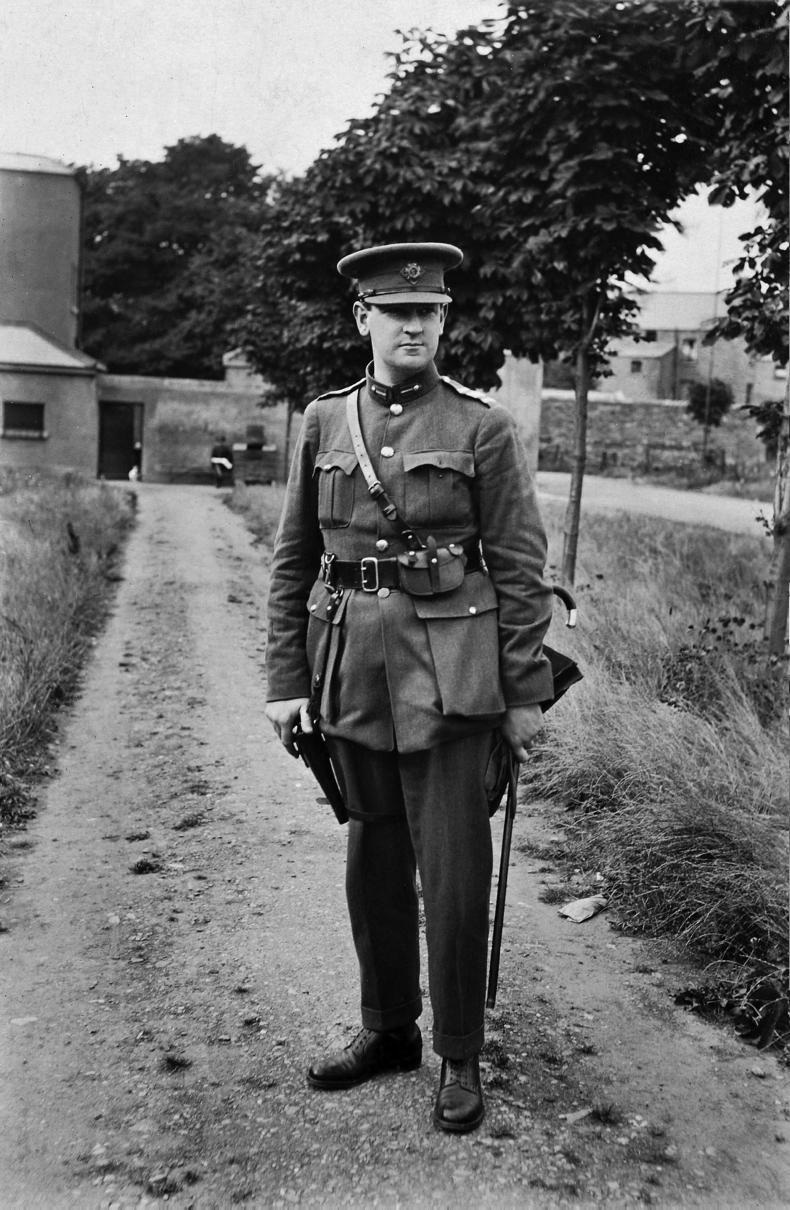
Michael Collins.
Michael inherited his father’s financial sense and public speaking ability to great effect.
He won an unused farming scholarship in 1913 and worked briefly for Craig, Gardiner & Co., accountants, three years later.
Following the death of her husband, near the turn of the century, Marianne had a new house built in the Collins’ farmyard at Woodfield.
Her widower-son, Seán and his children were living in that house when it was burned to the ground by the Essex Regiment in April, 1921.
Serene, pastoral Woodfield, exhibiting a magnificent head-sculpture of Michael, is today cared for by the Office of Public Works (OPW) and very accessible.
Rated fourth of Irish museums by Tripadvisor is Castleview Michael Collins’ Centre of Tim and Dolores Crowley.
Retired from farming, the couple have a unique collection of their Collins’ relative’s memorabilia, including documents, armoury and full-size versions of relevant military vehicles.
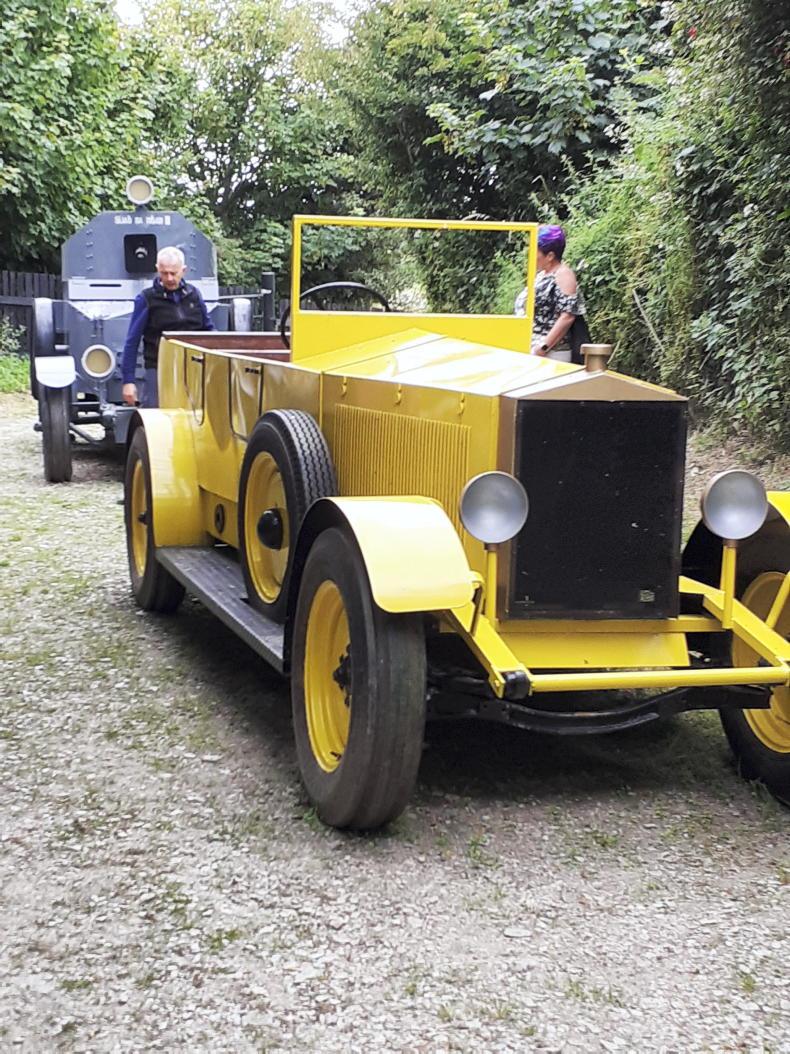
Tim Crowley, Curator of Michael Collins Centre and Michael Collins Memorial Park, Castleview, Clonakilty, with exhibits of vehicles of Collins' era - including yellow open-top Leyland similar to that in which he travelled to his demise at Béal na Bláth, County Cork, on August 22nd 1922.
Tim is an excellent history narrator and writer. His recent publication, ‘The Local Cost of Freedom’, tells of those troubled times.
400 years old, Clonakilty itself, is home to many Collins-connected locations and memorabilia. If engaging with the locals, one occasionally encounters Civil War “eggshells”, but time has eased political differences to almost camaraderie.
Michael Collins may rest at Glasnevin Cemetery – but he will forever live in beautiful West Cork!
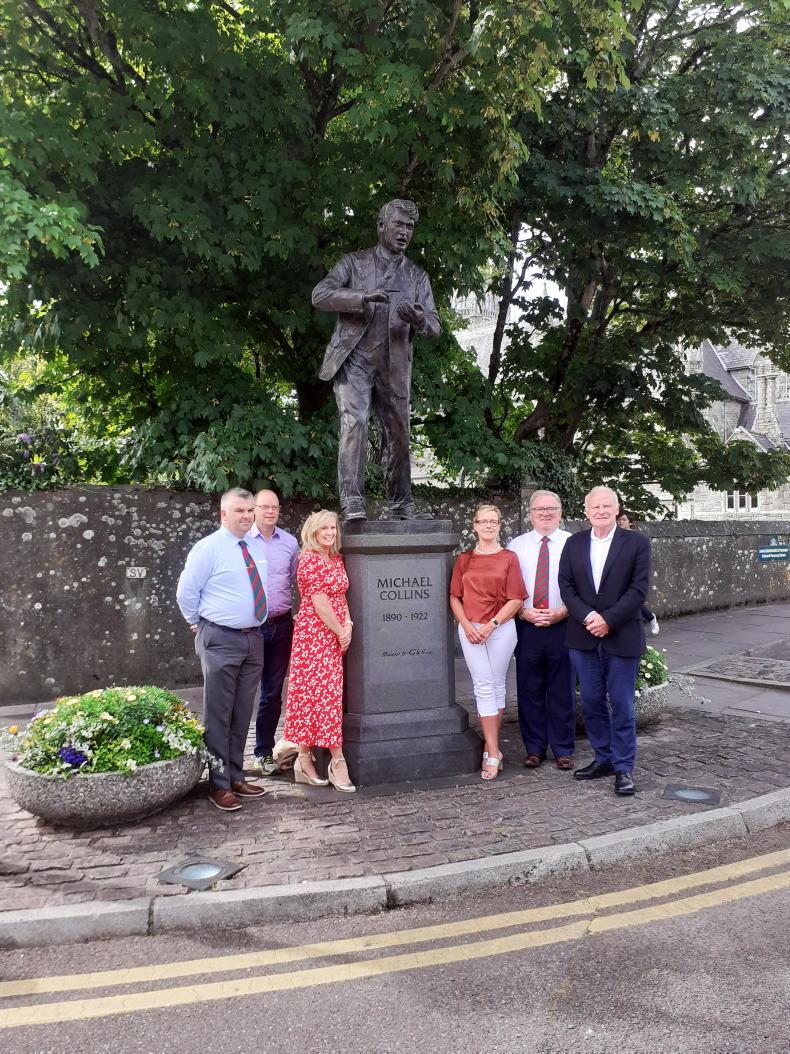
Collins Centenary commemoration festival committee. From left:- Pádraig O'Reilly; Mick O'Dowd;Nora Scannell; Anne Beechinor; Chris Henchy, Chair (and, also, current Deputy Mayor of Clonakilty); and, finally, J.J.Walsh.
A Collins’ Centenary Commemoration Festival Committee, based in Clonakilty’s Michael Collins’ House, is coordinating events.
This includes the Castleview Collins’ Centre Museum; Sam’s Cross Commemoration Committee, particularly relevant to Collins’ nearby birthplace; Dúchas, who guide Clonakilty town walks in July and August, and Cumann Seanchais Cloich na Coillte.
August 17:
Dúchas hosts a Gabriel Doherty talk in the Catholic Parish Centre - formerly the ‘Big Fellow’s’ early-teens school - with a panel discussion on Collins’ life on August 20. Also planned is a schoolroom - furnished 1903 style plus a re-enactment of the Post Office exam of 1905 which Michael sat. This later gave him access to many intelligence sources while working in London for the Post Office. Local historians, including Diarmuid Kingston and Castleview’s Tim Crowley, are included for a symposium here of films, talks and workshops on the Collins’ era.
August 19:
Lisavaird Community Hall will present an evening of history, song, dance and stories and an anniversary Mass will be celebrated in Lisavaird Sacred Heart Church on August 22.
August 20:
This will be the busiest festival day with a period-costume parade through Clonakilty at 2pm preceding the 3pm official opening. The County Library will exhibit many relevant books and organise a children’s quiz.
August 20 and 21:
A massive array of Collins’ memorabilia, including the Pat O’Hagan weaponry collection, will be displayed in O’Donovans hotel.
August 22: Cumann Seanchais Cloich na Coillte coach-trip to Béal na mBláth to commemorate Collins’ untimely demise there.
Peter Keohane’s Four Alls Pub will screen a number of notable movies, including ‘The Wind That Shakes The Barley’ and ‘Broken Harvest’.
Many other events, such as outdoor theatre, a treasure hunt and Clonakilty Black Pudding BBQ are also planned, as is a ‘departure toast’ to General Collins at 6.15p.m. August 22, which is the time he left the Four Alls a century ago. A number of wreaths – one here – will be laid that evening.
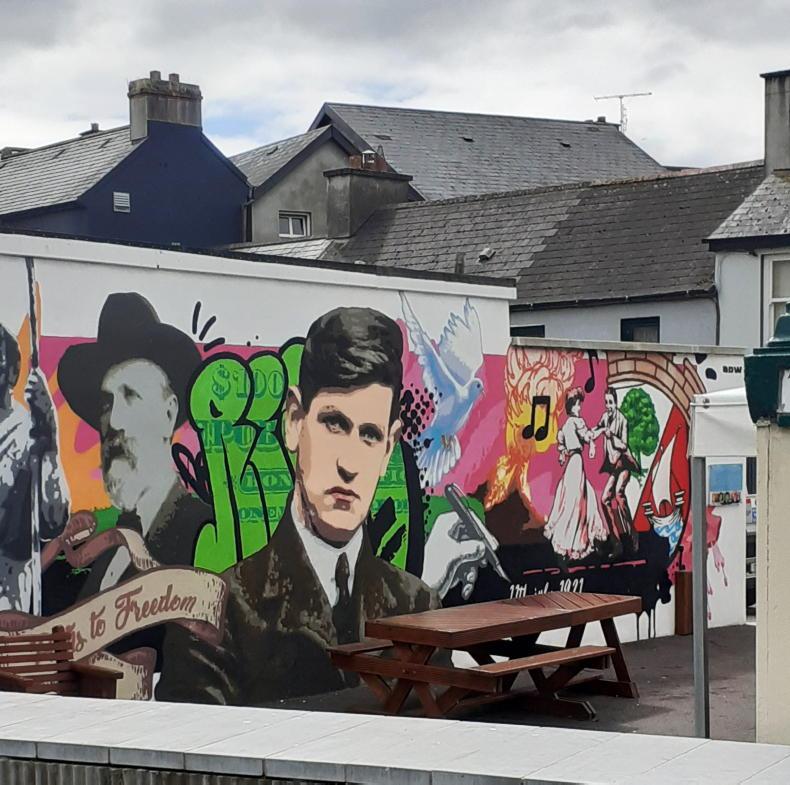
Mural of Clonakilty history;
Studying in Clonakilty, Michael stayed with sister, Margaret, at Emmet Square, a Georgian house formation unique outside of Dublin.
It encloses Kennedy Gardens Park, named on discovering that JFK’s triple-great-grandmother, Mary Sheehy, came from Woodfield – and may possibly have been related to the Collins clan!
The Michael Collins House Museum is located at the edge of Emmet Square and is wheelchair-accessible.
There is so much history in Clonakilty, a consistent Tidy Towns gold-medal holder.
Charlie Hurley’s Strand/Clóna Dairy was the first to introduce Cork to pasteurised milk.
His father, Jerome, was a major share-holder with Deasy’s Brewery, their boats transporting Daniel O’Connell to France occasionally and bottling Guinness for James’ Gate workers.
Jerome’s Uncle Tim resisted family eviction from Castleview Mills in 1886. The late Joe Walsh, a former managing director of Clóna, was instrumental, as Agriculture Minister, in keeping foot-and-mouth disease of 2001 at bay.
On June 15, 1922, west Cork-born patriot, Michael Collins, made an impassioned speech from an open-top car outside Clonakilty’s O’Donovans’ Hotel.
A recent re-enactment of this event was the kick off point of the centenary commemorations of the final days of the town’s most famous son – and, particularly, his life story.
Collins was a regular visitor to O’Donovans, built by John Sisk in 1889, and now run by the sixth generation of the family. Originally located in nearby Astna Street from 1853, the hotel has also hosted communications pioneer, Marconi; Home Rule activist, Charles Parnell and, following the 1943 crash-landing of an American B-17 warplane, that crew.
Their mascot a monkey called Tojo died within days and is now buried under the courtyard.
A young Michael
Michael was born, the youngest of eight, on October 16, 1890, in the family farmhouse at Woodfield, four miles west of Clonakilty.
Michael Snr was 75 then, a gifted carpenter and mathematician. His mother, Marianne (née O’Brien), came from Sam’s Cross, which is also the location of the Four Alls Pub, the main socialising centre for the area.
New signage explains the pubs unusual name: The king: ‘I rule all’; the soldier: ‘I fight for all’; the priest: ‘I pray for all’ and, finally, the farmer, – ‘AHH, BUT I PAY FOR ALL !’.
Michael’s many interests ranged from history and Gaelic culture to his father’s love of philosophy and numeracy.

Michael Collins.
Michael inherited his father’s financial sense and public speaking ability to great effect.
He won an unused farming scholarship in 1913 and worked briefly for Craig, Gardiner & Co., accountants, three years later.
Following the death of her husband, near the turn of the century, Marianne had a new house built in the Collins’ farmyard at Woodfield.
Her widower-son, Seán and his children were living in that house when it was burned to the ground by the Essex Regiment in April, 1921.
Serene, pastoral Woodfield, exhibiting a magnificent head-sculpture of Michael, is today cared for by the Office of Public Works (OPW) and very accessible.
Rated fourth of Irish museums by Tripadvisor is Castleview Michael Collins’ Centre of Tim and Dolores Crowley.
Retired from farming, the couple have a unique collection of their Collins’ relative’s memorabilia, including documents, armoury and full-size versions of relevant military vehicles.

Tim Crowley, Curator of Michael Collins Centre and Michael Collins Memorial Park, Castleview, Clonakilty, with exhibits of vehicles of Collins' era - including yellow open-top Leyland similar to that in which he travelled to his demise at Béal na Bláth, County Cork, on August 22nd 1922.
Tim is an excellent history narrator and writer. His recent publication, ‘The Local Cost of Freedom’, tells of those troubled times.
400 years old, Clonakilty itself, is home to many Collins-connected locations and memorabilia. If engaging with the locals, one occasionally encounters Civil War “eggshells”, but time has eased political differences to almost camaraderie.
Michael Collins may rest at Glasnevin Cemetery – but he will forever live in beautiful West Cork!

Collins Centenary commemoration festival committee. From left:- Pádraig O'Reilly; Mick O'Dowd;Nora Scannell; Anne Beechinor; Chris Henchy, Chair (and, also, current Deputy Mayor of Clonakilty); and, finally, J.J.Walsh.
A Collins’ Centenary Commemoration Festival Committee, based in Clonakilty’s Michael Collins’ House, is coordinating events.
This includes the Castleview Collins’ Centre Museum; Sam’s Cross Commemoration Committee, particularly relevant to Collins’ nearby birthplace; Dúchas, who guide Clonakilty town walks in July and August, and Cumann Seanchais Cloich na Coillte.
August 17:
Dúchas hosts a Gabriel Doherty talk in the Catholic Parish Centre - formerly the ‘Big Fellow’s’ early-teens school - with a panel discussion on Collins’ life on August 20. Also planned is a schoolroom - furnished 1903 style plus a re-enactment of the Post Office exam of 1905 which Michael sat. This later gave him access to many intelligence sources while working in London for the Post Office. Local historians, including Diarmuid Kingston and Castleview’s Tim Crowley, are included for a symposium here of films, talks and workshops on the Collins’ era.
August 19:
Lisavaird Community Hall will present an evening of history, song, dance and stories and an anniversary Mass will be celebrated in Lisavaird Sacred Heart Church on August 22.
August 20:
This will be the busiest festival day with a period-costume parade through Clonakilty at 2pm preceding the 3pm official opening. The County Library will exhibit many relevant books and organise a children’s quiz.
August 20 and 21:
A massive array of Collins’ memorabilia, including the Pat O’Hagan weaponry collection, will be displayed in O’Donovans hotel.
August 22: Cumann Seanchais Cloich na Coillte coach-trip to Béal na mBláth to commemorate Collins’ untimely demise there.
Peter Keohane’s Four Alls Pub will screen a number of notable movies, including ‘The Wind That Shakes The Barley’ and ‘Broken Harvest’.
Many other events, such as outdoor theatre, a treasure hunt and Clonakilty Black Pudding BBQ are also planned, as is a ‘departure toast’ to General Collins at 6.15p.m. August 22, which is the time he left the Four Alls a century ago. A number of wreaths – one here – will be laid that evening.

Mural of Clonakilty history;
Studying in Clonakilty, Michael stayed with sister, Margaret, at Emmet Square, a Georgian house formation unique outside of Dublin.
It encloses Kennedy Gardens Park, named on discovering that JFK’s triple-great-grandmother, Mary Sheehy, came from Woodfield – and may possibly have been related to the Collins clan!
The Michael Collins House Museum is located at the edge of Emmet Square and is wheelchair-accessible.
There is so much history in Clonakilty, a consistent Tidy Towns gold-medal holder.
Charlie Hurley’s Strand/Clóna Dairy was the first to introduce Cork to pasteurised milk.
His father, Jerome, was a major share-holder with Deasy’s Brewery, their boats transporting Daniel O’Connell to France occasionally and bottling Guinness for James’ Gate workers.
Jerome’s Uncle Tim resisted family eviction from Castleview Mills in 1886. The late Joe Walsh, a former managing director of Clóna, was instrumental, as Agriculture Minister, in keeping foot-and-mouth disease of 2001 at bay.











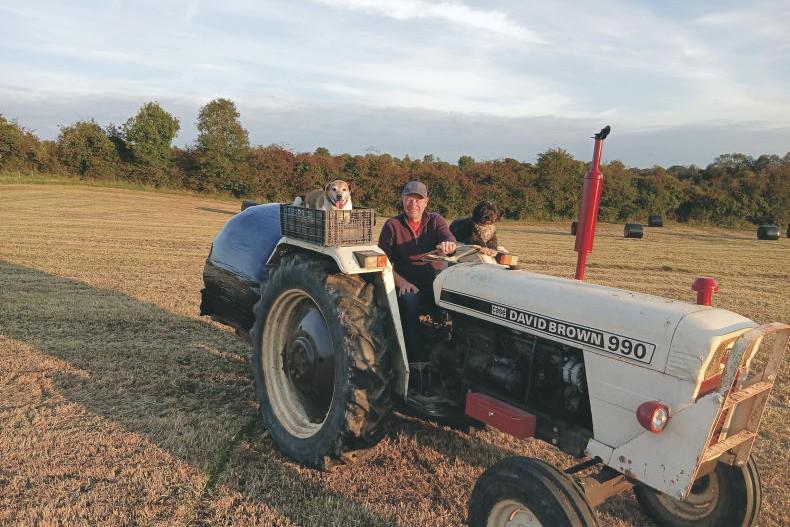

SHARING OPTIONS